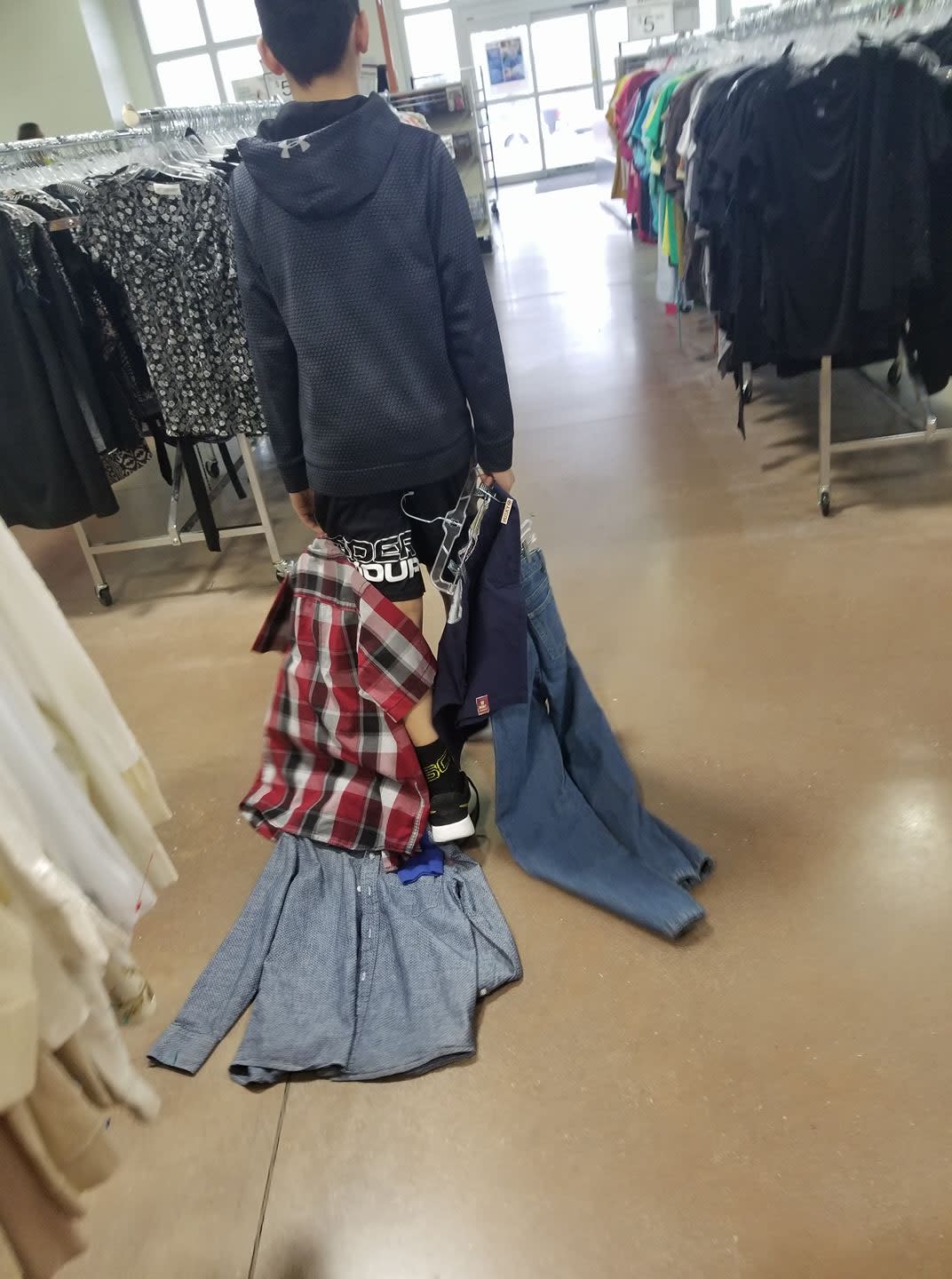Mom makes 'entitled' teen shop at Goodwill: 'Money isn't everything'

A mom whose teen son acted “entitled” about his wardrobe taught him a public lesson that “Money isn’t everything.”
Cierra Brittany Forney, a mother of three in Auburn, Ga., shared the experience on Facebook on Sunday, in an explosive post that earned almost 570K reactions, more than 212K shares, and 140K comments describing her as “Supermom,” among other accolades.
“So lately, my 13 year old son had been acting a little… entitled,” wrote Forney. “Acting like he’s too good to shop at Wal-Mart or making snarky comments about kids at school who shop at the goodwill and quite a few other things. I don’t tolerate that. Today, he took his own 20.00 to the goodwill to buy clothes to wear the entire week to school. Whatever he found is what he would have to wear. He isn’t happy and shed a few tears but I firmly believe in 15 years he will look back and laugh at the day his Mom made him shop at goodwill. I want to teach my kids that money isn’t everything and if you have to degrade other people because of where they shop, then you too will shop there. Side note, I love the goodwill!! If you have something rude to say about my choices, keep that to yourself because [expletive] I’m trying to raise good, respectful humans.”
Forney did not return Yahoo Lifestyle’s request for comment, but she provided a Facebook update Tuesday, expressing disbelief over the reach of her story. “My son learned a valuable lesson from this and I believe it is just another story we can add to our lives memory to look back on,” she wrote. “I didn’t do this to punish him. It wasn’t to show him that goodwill isn’t a good place to shop. I did this to teach him that money and name brands don’t change who we are as people. He can still be the amazing, adorable, loved kid that he is WITHOUT the expensive stores!”
She also acknowledged the origin of her son’s belief system. “I do realize that we are partly to blame for his expectancy of always having name brands,” Forney wrote. “My husband and myself had our son when we were VERY young. We always strived to give him all the things we never had and because of that, he has grown to expect these things.”
Forney went on to address her critics, who interpreted the post as a slam to budget-conscious shoppers, revealing that she loves the Goodwill. And while a majority of the comments were supportive, Forney revealed that her parenting move wasn’t accepted by all. “I DO NOT care what anyone has to say about my post because I SOLEY did this to help my son become a better man,” she said. “All the positive feedback and comments have brought me to tears and so have all the negative ones. All that matters is my son is completely 100 percent okay with what happened. My son has learned a valuable lesson from this AND my son is rockin’ his button up shirt he bought from the Goodwill with PRIDE today!!!”
Forney’s post has largely been met with kudos, unlike those from other parents who forced their kids into wearing what they believed was undesirable clothing. For example, in 2013, a Utah mom triggered a debate on public shaming when she posted Facebook photos of her daughter wearing thrift-store clothing as punishment for bullying classmates for the same.
As for whether quid-pro-quo parenting tactics are advisable, that’s a complex question, according to Deborah Gilboa, M.D., a parenting and youth development expert. “Having a kid wear certain clothing as a response to bullying others about their clothes may be appropriate if it’s accompanied by conversations about privilege, entitlement, and empathy,” she tells Yahoo Lifestyle.
There may be value for parents who go public with punishments if their intent is to start a discussion about social norms, decreasing bullying, and taking ownership of any parenting tactics that resulted in a child’s behavior. “Seeing a child’s flaws with a three-dimensional lens and holding them accountable is engagement, love, and parenting,” she says, adding the caveat that photos have the potential to go viral, potentially posing safety risks and causing children psychological harm.
“We have to be as careful about social media as we’d want our kids to be,” she said.
Read more from Yahoo Lifestyle:
Dentist threatens to report mom for not making appointment for kids’ 7 fillings
Mom ‘disgusted’ by dress code requiring teen girls to wear dresses or skirts ‘at all times’
Controversial ‘free-range parenting’ is now legal in Utah — here’s what that means
Follow us on Instagram, Facebook, and Twitter for nonstop inspiration delivered fresh to your feed, every day.

